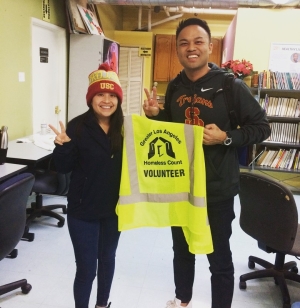USC Partners with Government Agency on Homeless Count
February 15, 2017 / by Brenda Wiewel and Joanna Clay- Research
A group of volunteers, most wearing cardinal and gold, entered the orientation room at Newton Police Station in South Los Angeles to find yellow vests, maps, flashlights and clipboards waiting for them. These were the tools they would use as they fanned out in the surrounding neighborhood, combing the streets, alleys, parking lots and other areas where a person might find sleep for the night because they have no permanent home.
This was the annual Greater Los Angeles Homeless Count, overseen by the Los Angeles Homeless Services Authority (LAHSA), a joint county-city agency. The census of men, women and children, which took place in late January, is essential to ensuring more targeted resources to those who are most in need and also raises awareness of this homelessness epidemic, which affects about 45,000 people in Los Angeles County.
Because USC led the data collection this year, a call to action was sent out across the university to recruit volunteers for a thorough count, particularly in the South Los Angeles region, or SPA 6, which neighbors the University Park campus. Of the 1,029 volunteers who participated in the SPA 6 region, 243 represented USC.
“It was an amazing experience, getting to be on a team of all USC students,” said Olivia Beha, an undergraduate student at the USC Dornsife College of Letters, Arts and Sciences. “It was both devastating and enlightening to understand the variety of living conditions that people may face when experiencing homelessness.”
Some volunteer teams found one or two individuals experiencing homelessness in a residential area, while others discovered 40 to 50 people living in tent cities. As volunteers returned with their tally sheets, the talk was about the cold temperature that night and the realization of how many people were experiencing homelessness so close to their own community.
“The neighborhood appears different when you look at it from the eyes of someone trying to find a place to sleep outdoors,” said Delphie Morales, a Master of Social Work student at the USC Suzanne Dworak-Peck School of Social Work. Researchers from the school will also conduct demographic surveys on the streets and in shelters in the months following the initial count, as well as analyze the data for LAHSA.
The survey hopes to fill gaps in data, reaching harder-to-find populations — such as youth, families and women, said Karen Lincoln, an associate professor at the USC Suzanne Dworak-Peck School of Social Work.
“To do a homeless count is a massive undertaking that has a lot of complexity so it’s really important that we have experts helping to guide our methodology,” said Sarah Mahin, director of policy and planning at LAHSA. “The knowledge USC has about L.A. County makes a great deal of difference.”
USC’s partnership with LAHSA this year builds upon the university’s collaborative effort to end homelessness in Los Angeles, as well as the USC Suzanne Dworak-Peck School of Social Work’s leadership of the American Academy of Social Work and Social Welfare’s Grand Challenge to End Homelessness. The promise of housing for everyone is what USC and the city of Los Angeles are now working toward, with the belief that homelessness is a problem that can be solved.
For more information about the USC Initiative to Eliminate Homelessness, contact Brenda Wiewel, director for the initiative.
To reference the work of our faculty online, we ask that you directly quote their work where possible and attribute it to "FACULTY NAME, a professor in the USC Suzanne Dworak-Peck School of Social Work” (LINK: https://dworakpeck.usc.edu)
